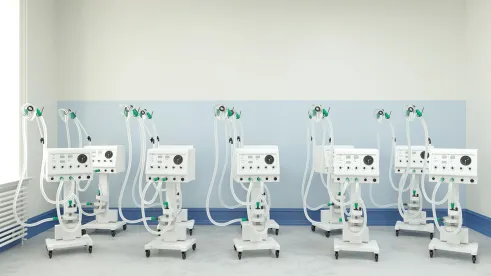A trend is emerging. Commercial health plans are delaying and even denying reimbursement for COVID-19 hospitalizations—especially high-dollar inpatient stays. Plans are attempting to defer these claims to workers’ compensation on the health plans’ assertion that COVID-19 is a work-related illness. Some hospitals defer to health plans, as it relates to these types of claims, because it is plausible that patients could have contracted COVID-19 at work and because workers’ compensation is typically primary for coordination of benefits purposes. But workers’ compensation is notoriously complex, and hospitals may not understand the nuances of the program enough to know when it is appropriate to challenge this type of health plan denial. Failing to appeal these denials may impact hospital reimbursement, as well as a hospital’s accounts receivable days, known as “AR days,” depending on the number of COVID hospitalizations and the corresponding amount in open balances. It is definitely a conundrum. The goal of this article is to provide hospitals and its business offices with a better understanding of COVID-19 as an occupational illness to enable hospitals to be better equipped to determine when it is appropriate to challenge health plans that seek to delay or deny reimbursement for COVID hospitalizations.
Demystifying workers’ compensation with a brief overview
It is important to have a general understanding of workers’ compensation coverage. Workers’ compensation is a state-mandated insurance program that protects employers and employees from financial loss when employees suffer job-related injuries and illnesses. Virtually all employers, even small employers, must maintain workers’ compensation coverage. If an employee suffers an occupational injury or illness, an employer through its workers’ compensation carrier may provide missed wage replacement, temporary and permanent disability, death benefits, and supplemental benefits. But one of the basic benefits in all states is medical and hospital benefits. Each state regulates workers’ compensation coverage differently, which is a critical factor with respect to COVID-19 and whether a health plan may delay or deny payment. In some states, employer premiums for workers’ compensation policies are experience-rated, meaning that employers that file more claims pay more in premium.
Scenario
Patient X is a grocery worker who becomes ill and is eventually hospitalized with a COVID-19 diagnosis. Upon discharge, the hospital submits the bill to the health plan. The health plan fails to timely adjudicate the claim. Instead, the health plan contacts the hospital and states that it needs additional information. The health plan believes the patient is covered by workers’ compensation because the patient probably acquired the virus at work. Should workers’ compensation cover Patient X’s hospitalization?
It’s complicated.
States’ response to classifying COVID-19 as an occupational illness
When it comes to COVID-19 as an occupational illness, states have responded differently. On one hand, 17 states and Puerto Rico have extended workers’ compensation coverage to include COVID-19 as a work-related illness. Within this group of states, there are varying degrees of coverage.[1] The majority of these states have established COVID-19 workers’ compensability presumptions for various types of workers. In these states, if a designated worker contracts COVID-19, it is generally presumed that the worker acquired the virus during the course of employment thus eligible for workers’ compensation, including medical and hospital benefits. But employers can dispute this presumption and produce evidence to the contrary, if done so within a certain amount of time under state law. Hospitals are often left out of this decision-making process, which is unfortunate because hospitals may have additional information about where the worker contracted COVID-19.
On the other hand, some states still consider COVID-19 an “ordinary disease of life,” similar to a cold or the flu, which means the virus is not covered by workers’ compensation. Still other states have taken no action to clarify whether COVID-19 hospitalizations and treatments should or should not be covered by workers’ compensation.
Workers’ compensation laws were difficult to navigate prior to the pandemic, which makes the recent patchwork of legislation and executive orders classifying COVID-19 as an occupational illness even more difficult to understand. As a result, health plans may accidentally or intentionally delay or deny reimbursement.
Take Patient X for example. Grocery workers in California may be entitled to workers’ compensation.[2] But elsewhere, these same workers are not entitled to benefits. A health plan with members in several states, including California, might seek to delay or deny payment to hospitals elsewhere because the health plan is successful in ultimately denying the same COVID hospitalizations in California. Therefore, it is important for hospitals to review all claims when health plans seek to delay or deny payment for COVID hospitalizations.
Takeaways
It is complicated to determine if a patient’s stay is covered by workers’ compensation when faced with a health plan that attempts to delay or deny payment. If faced with this scenario, hospitals should consider the following:
(1) Understand your state workers’ compensation laws and the coverage available for COVID-19 hospitalizations. Determine if the state where the hospital is located designates COVID-19 as an occupational illness and whether the patient’s occupation falls within the state’s definition of a “covered worker.”
(2) If the patient is not eligible for coverage under workers’ compensation, then the hospital should appeal the health plan’s delay in or denial of reimbursement. In addition, the hospital should consider contacting the patient’s employer to jointly assess whether to dispute any state presumptions that a worker contracted COVIID-19 on the job.
(3) If workers’ compensation denies all or part of a claim, the hospital should submit the remainder of the bill to the health plan.
(4) As an employer, the hospital should understand whether its own workers’ compensation policy is experience-rated. If so, the hospital may want to be more diligent about ensuring the hospital’s health plan or health plan administrator does not inappropriately delay or deny claims based on workers’ compensation coverage.
[1] States limit coverage to “covered workers,” with each state defining occupations that fall within the scope of coverage.
[2]See Cal. Labor Code § 3212.88.




 />i
/>i

